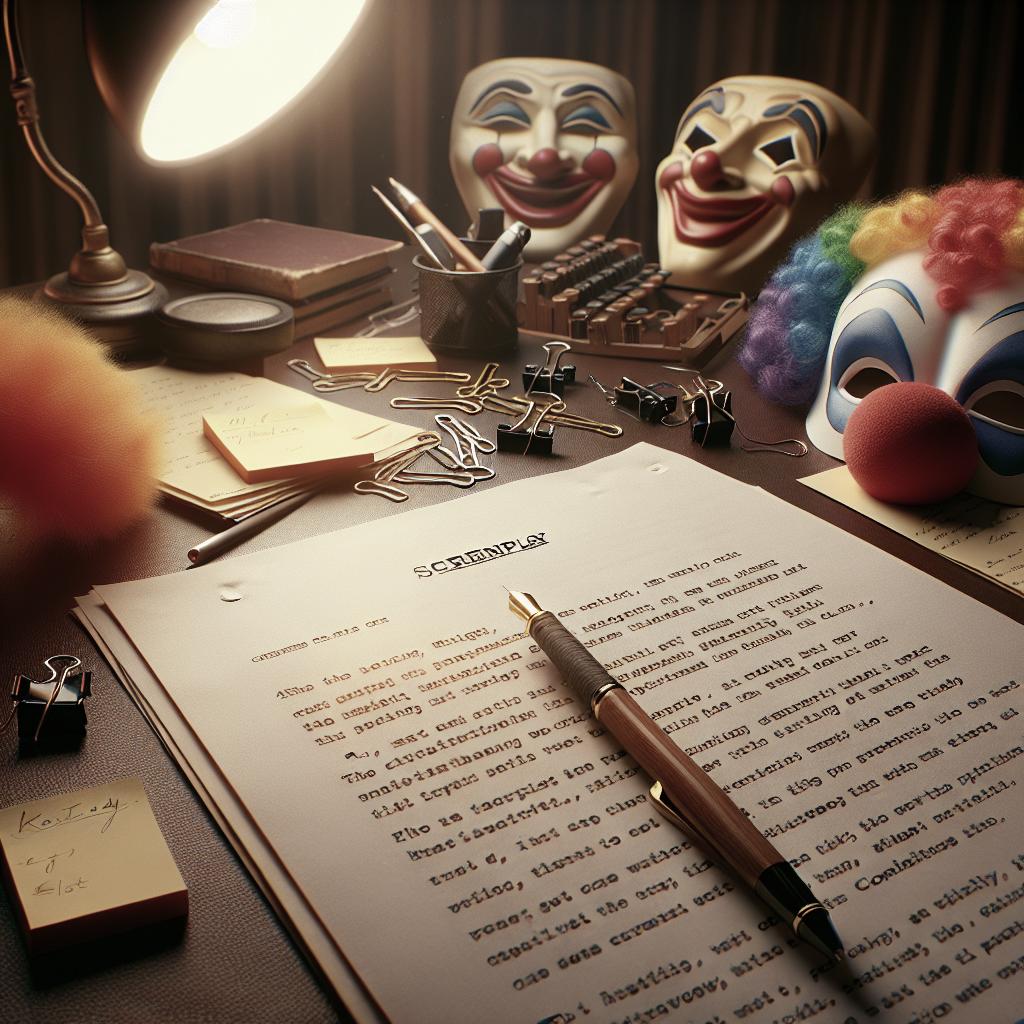Writing comedy scripts is a nuanced craft that demands attention to timing, character development, and audience understanding. This blog post delves into the key aspects of creating successful comedic content for scripts. We’ll discuss essential elements such as understanding how comedy works in writing, directing, and editing, and also provide a comprehensive guide to comedic writing. You’ll learn rules of comedy, practical tips for writing humorously, and crucial advice on what to avoid. Additionally, we’ll explore lessons from comedy legend Gene Wilder and show how you can write and produce your scripts seamlessly. —
Watch: How Comedy Works in Writing, Directing & Editing
Understanding how comedy functions from all angles—writing, directing, and editing—is crucial. Humor is an intricate dance, relying heavily on timing, tone, and delivery. In writing, your job is to craft dialogues and scenarios that set up punchlines and evoke laughter. However, the real magic often happens during directing and editing, where the timing gets polished and the punchlines land perfectly. Insight into directing helps you understand how scenes should be paced and actors’ movements choreographed to enhance humorous elements. Editing, on the other hand, is where comedic timing is refined, ensuring that every joke, pause, and visual gag hits home. By grasping how each of these components work, you’ll be better equipped to write scripts that are not only funny on paper, but also in performance.
Guide to Comedic Writing
What is comedy writing?
At its core, comedy writing is about creating content that elicits laughter. It involves crafting situations, dialogues, and characters that are humorously exaggerated yet relatable. From slapstick and satire to dark humor and parody, comedy writing spans a variety of sub-genres, each with its own unique characteristics and appeal. Good comedy writing acknowledges the human condition, often highlighting the absurdity of everyday life. It requires a keen observational eye and a deep understanding of social nuances. The ultimate goal is to resonate with the audience on an emotional level, making them chuckle, giggle, or burst out laughing through clever wordplay, situational irony, and well-timed jokes.
Rules of Comedy, Explained
Comedy thrives on structure, and understanding the rules can significantly enhance your writing. One fundamental principle is the “rule of threes,” which posits that a trio of events or characters are inherently funnier than other numbers. This pattern sets up a premise, builds tension, and delivers a punchline, effectively creating a satisfying comedic payoff. Another essential rule is the concept of subversion, where expectations are set up only to be hilariously thwarted. This element of surprise is central to a lot of humor, as it catches audiences off guard and elicits laughter from the unexpected twist or turn. Timing, also crucial, ensures that punchlines are delivered right when the audience is primed for a laugh, without dragging the joke or rushing it.
Tips and Tricks for Writing Comedy
One key tip for writing comedy is to be concise. Comedy often relies on brevity; long-winded explanations or drawn-out setups can kill the momentum of a joke. Aim to be punchy and precise with your words, ensuring each line packs a comedic punch. Editing and refining your script can help trim the fat, keeping it tight and impactful. Another useful trick is to read your script aloud. Hearing the dialogue can give you a better sense of its rhythm and timing, offering insights into how the jokes will land. Additionally, engaging in collaborative writing or workshopping your script with others can provide new perspectives and ideas, enhancing the humor through collective creativity.
WRITING COMEDY TIPS
How to Make Your Script Funny
The foundation of a funny script is strong character development. Characters should be distinct and possess exaggerated traits that lend themselves to humor. A well-defined character reacting to absurd situations in a way that aligns with their personality can generate consistent laughs. Additionally, incorporate visual humor whenever possible. Physical comedy and sight gags can be just as impactful as verbal jokes. Scripts like those for “The Office” are masterclasses in visual humor, using actors’ expressions and body language to amplify the comedic effect.
Writing Comedy Taboos
Things to Avoid in Comedy Writing
While pushing boundaries can be a part of comedy, it’s essential to be mindful of certain taboos. Avoid jokes that perpetuate stereotypes or target marginalized groups; these can be harmful and alienating to parts of your audience. Humor should be inclusive, making everyone feel part of the joke rather than the butt of it. Moreover, steer clear of overly complicated setups that require excessive explanation. If the audience needs a manual to get the punchline, the joke likely won’t land. Simple, relatable premises often have the broadest appeal, ensuring your humor connects universally.
Up Next
Comedy Lessons from Gene Wilder
Gene Wilder is an icon whose comedic performances have stood the test of time. A profound lesson we can learn from him is the importance of sincerity in comedy. Wilder’s characters were often humorous because they were deeply earnest, their seriousness in absurd situations magnifying the comic effect. Wilder’s nuanced performances also highlight the value of timing and delivery. He mastered the art of the comedic pause, understanding that sometimes, the silence between words can be the funniest part. He demonstrated that great comedy often comes from a place of genuine emotion and impeccable timing.
Write and Produce Your Scripts All in One Place
Today’s digital tools make it easier than ever to write and produce your comedy scripts. Platforms like Celtx and Final Draft offer comprehensive solutions for scriptwriting, allowing you to format your scripts professionally. These tools often include features for collaboration, making it simpler to get feedback and refine your jokes. Additionally, video editing software like Adobe Premiere Pro or Final Cut Pro can help you produce and edit your comedic scenes, ensuring your timing and delivery are flawless. By leveraging these tools, you can streamline your process from writing to production, bringing your vision to life with professional polish. — Future Prospects
| Section | Summary |
|---|---|
| How Comedy Works | Examine how writing, directing, and editing contribute to comedic elements. |
| Guide to Comedic Writing | Introduction to comedy writing and its diverse genres. |
| Rules of Comedy | Explanation of fundamental comedy rules like the rule of threes, subversion, and timing. |
| Comedic Writing Tips | Practical tricks for enhancing humor, emphasizing brevity and collaborative writing. |
| Making Your Script Funny | Emphasis on strong character development and visual humor. |
| Comedy Taboos | Advises against perpetuating stereotypes and overly complicated setups. |
| Lessons from Gene Wilder | Highlights the importance of sincerity, timing, and delivery in comedy. |
| Writing and Producing Tools | Guidance on using digital tools to streamline scriptwriting and production processes. |

